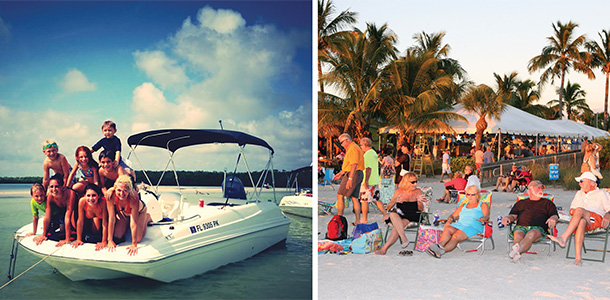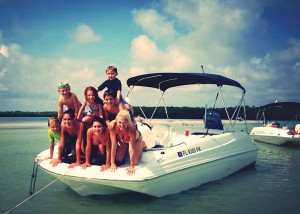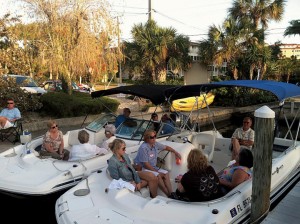Opportunities in boat clubs, sharing

Creating synergies and new profit centers
Not long ago, boat rental was seen as the competition of boat dealers. But in the shadow of the great recession, drastic changes have brought clubs and rentals into the realm of traditional boat dealers and stakeholders.
That novel alliance has created new synergies for the dealer and has raised the profile of non-standard boating options.
John Giglio, president and CEO of Freedom Boat Club said that as it celebrates its 25th year as a company, that relationship has undergone some drastic changes.
“Traditionally, dealers have looked at us as a competitor,” said Giglio. “But in the last several years we’ve really tried to foster relationships with dealers.”
He said that sea change helped the company find 30 new franchisees in the past two years and has opened up boating to people pondering the idea of buying, but who just might not be ready to commit to traditional ownership.
“One thing that we’ve seen as a trend in our memberships is we get a lot of people new to boating or people that have had some limited experience, but boating is something they want to get into,” said Giglio, who added that FBC’s training gives new boaters confidence in their skills and gets them thinking about what they want out of boating.

“What ends up happening over time is they either continue with the club — which many people do — or they determine they want a bigger boat, a little more flexibility in what they can do with their boat and they go out and purchase their boat,” said Giglio.
He said that while FBC hates to see people leave the club, the company goes the extra mile to help them on their next step in boating.
“We try to foster those relationships with dealers locally, so when someone is ready to exit the club, we say, ‘Go see our friend up at Naples Boat Mart and they’ll put you into a Key West or a Hurricane.’ We try to make it really easy for them to transfer out of the club,” said Giglio.
He said just getting familiar with the boats is a huge sales driver for the brands Freedom Boat Club works with.
“We’ve found that people buy the types of boats that they use on a day-to-day basis,” said Giglio. “On the west coast of Florida here, we do a lot of business with Nautic Global Group and the Hurricane boat line. So what will end up happening is a lot of people who want a deck boat get a Hurricane, if they’re looking for a fishing boat they looking for a fishing boat, they’re going to go buy a Key West or a Cobia because that’s primarily what we run and those are the boats that they’re comfortable with.”
Giglio said FBC’s statistics show that club members are primed to buy when they do exit the club.
“A good 50 to 60 people leave my club each year to buy their own boat,” said Giglio.
Jeremy Holcomb, marina manager and club director at Legendary Marine said those same synergies helped the dealer’s new boat club fill a critical gap in the Destin, Fla., boating community. He said the club, which launched in January of 2013, has translated into a new profit center for the business and more handshakes on the sales floor.
“There’s a boat club member and there’s a boat owner, and there is a person that’s in between there that just hasn’t found their way yet,” said Holcomb, saying the club helps those people in between find what they really want. “That’s how it really complements sales.”
The Legendary model leverages the dealer and marina infrastructure, but since it’s a separate, autonomous division, ongoing club boat orders go directly to the dealership’s bottom line.
 “The folks stay in new boats, boats that are very well maintained, everybody benefits since the club is its own division and then we’ve got sales that we’re purchasing and selling boats through and our service department here that is servicing our boats,” said Holcomb.
“The folks stay in new boats, boats that are very well maintained, everybody benefits since the club is its own division and then we’ve got sales that we’re purchasing and selling boats through and our service department here that is servicing our boats,” said Holcomb.
He said the club uses all the statistics gleaned from its dry-stack marina facility to choose their club fleet. He knows the five most popular boats that come out of the marina at any given time.
“Those five boats are literally our picks,” said Holcomb. “They’ve been really excellent, we’ve gotten a lot of amazing feedback on those boats.”
He also gets great feedback from the sales staff.
“We, of course, purchase the boats from ourselves and we never allow a boat to stay in the club for more than six months,” said Holcomb.
The members love the brand-new offerings, and when Holcomb orders a new fleet, those boats are sent back to the Legendary pre-owned lineup.
“At the end of that six-month period, they’ll be turned back to our sales department to be sold at a favorable price,” said Holcomb, who has seen more and more buyers hold out for great deals on former club boats. “So someone gets a great bargain on a boat that’s been incredibly well cared for.”
He said new boat sales also get a boost from exiting members through a unique refund plan.
“We offer up to two years in the boating club and we refund them 70 percent of their initiation fee on the purchase of a new boat from Legendary Marine,” said Holcomb. “So there is definitely a benefit and we absolutely have seen people take advantage.”
Operating apart from the main business at Legendary also keeps the service department busy with work on club-owned boats and installations for the new fleet boats throughout the year.
“From a service standpoint, we’ve got a massive service department here that gives us same-day treatment for the better part,” said Holcomb.
He said club members themselves are great at drawing new boaters into the community.
“It’s a fantastic marketing tool as well. These folks that are in the boating club, it’s rare that it’s just a wife and a husband and the kids,” said Holcomb. “They always have a friend or a neighbor and other folks that wouldn’t be boating come along.”
Should you start a boat club?
Whether a dealer is looking to sign on with a larger operation or strike out on their own, there are a whole host of things to think about.
It’s best to think of a boat club as a brand new business, so dealers should get down to the basics: location, demographics and profits.
“Places that boating clubs work, in my opinion, are destinations,” said Holcomb, noting that the Destin area is a popular spot for fishing, cruising and watersports. “It really depends how many folks they have walking through the door.”

Giglio said aging boaters are a great potential demographic for any boat club.
“Almost the final stop is a boat club,” said Giglio. “At some point the physical demands of actual boat ownership are difficult for a lot of people. They don’t want to give up boating, but they just can’t handle traditional boat ownership anymore.”
He said their franchises in Florida are already reaping the benefits of that population.
“Being on the west coast of Florida, we have a huge retirement population here. It’s everything they want in boating, without the stress of having to own and operate a boat themselves,” said Giglio.
Giglio says that while destination locations are certainly a big help, a great club also requires a great operator behind the scenes.
“It’s funny, you tell someone about what we do and they say, ‘Wow, that’s brilliant, it sells itself!’ Well, as it turns out, it doesn’t!” said Giglio.
“We’ve had a lot of different owners and operators go through the system. The business owners running the operation on a day-to-day basis, they are the most successful,” said Giglio.
As far as financials go, there are many options, price points and other things to keep track of.
Firstly, there is the cost of setup.
For Freedom Boat Club franchises, most everything is up front and a 6 percent royalty fee after the first year for ongoing training, insurance and marketing support.
“Initial franchise fee is $38,000, and that gets them all the training, the startup package,” said Giglio. “We give them the business in a box so on day one, they have everything they need to open up the doors. Then beyond that, they have to purchase a minimum of four boats.”
The consumer then pays directly to the dealer or marina hosting the club.
“The consumer is looking at — based on the location — anything from $4,000 to $7,000, then a monthly fee after that,” said Giglio, adding that there are various seasonal packages for dealers that don’t operate in the winter months starting at $149 per month.
The Legendary Boat Club offers similar pricing for the Destin area.

“I usually bring that up very first thing. I’m very proud of what we charge,” said Holcomb. “We’ve kept it very simple: unlimited boating, five types of boats, come as often as you like 365 days a year. We offer the same package all around, $6,500 is your initiation fee then $299, there’s no surcharges — it is what it is.”
So with Legendary’s 43 current members, that’s a hair under $12,900 gross income each month in fees alone.
Insurance is another thing to think about. While many peer-to-peer options and Freedom Boat Club franchises offer insurance, dealers creating their own club are responsible for protecting themselves and their club members should something happen on the water.
Far-flung marinas or dealers that might not find what they’re looking for in a standard boat club setup can still benefit from rentals through the peer-to-peer marketplace. Dealers can make a small profit with the occasional renter without all the hassle of creating a true rental fleet or fussing with insurance.
While a club, even a great club, won’t replace new boat sales as the No. 1 profit center, it could buoy a business through economic bumps with an additional revenue stream.
“It’s a great business segment,” said Giglio. “While the rest of the industry has been struggling over the five to six years, we’ve experienced double-digit growth over the last seven years.”
Peer-to-peer rentals as a sales tool
One can’t dig into boat clubs and rentals without talking about the nascent peer-to-peer segment.
Like traditional boat rentals and boat clubs, peer-to-peer rentals were seen as a major source of competition for boat dealers. But stakeholders in traditional boat ownership are finding that the concept is useful on the sales floor and can bring new boaters into the industry.
“The first thing that we’ve been testing with dealers is getting them to understand how Boatbound can help them sell new boats,” said Aaron Hall, CEO and founder of Boatbound.
He said if a customer is waffling about a purchase, the concept of peer-to-peer income might be the push they need.
“Our strategy is to really be using Boatbound as a reason to push people over the edge to make a buying decision,” said Hall. “If it’s a financial decision — that they can’t quite afford it — or to upgrade someone to a bigger boat, it’s a way to offset some of those costs.”
If done right and in the right market, Hall said that a couple rentals a month can actually mean a free boat at the end of the dock.
“The obvious benefit is that the typical boat is unused 95 percent of the year,” said Hall. “So you can offset the storage, maintenance or the financial cost of owning a boat by renting it one or two times a month — you can offset the whole burden.”
He said sales staff could use the popular home and apartment-sharing platform Airbnb as a successful example.
“Like Airbnb, you’ll start to see people building around it. Our platform is designed to create micro-entrepreneurs all over the place,” said Hall. “There’s a half a dozen people that are doing something to create their own little rental fleet and market it through Boatbound.”
In 2014, Boatbound made it easier to add a knowledgeable captain to a rental to make things even easier for renters and new boaters.
“We now have 30 to 40 percent of our rentals can come with a captain. So it doesn’t take any experience to get out on a boat,” said Hall. “That’s one of the main barriers to entry in boating is that people think they have to be an expert boater.”
He said those options could keep new or inexperienced boaters coming into the community without a steep learning curve or big cost.
“As we continue to push that option and that experience, we get people into boating. And after they do that once or twice, the next logical step is to go learn how to do it themselves,” said Hall. “Ultimately, that puts them into the ecosystem and hopefully turns them into future boat buyers. And everyone is happy about that.”




